University Psychology: Research Methodologies Assignment
VerifiedAdded on 2022/08/25
|7
|1758
|27
Homework Assignment
AI Summary
This assignment solution delves into various research methodologies used in psychology. It begins by outlining descriptive research methods, including surveys and correlational studies, and explains their purpose in systematically describing phenomena. The solution then differentiates between random selection and random assignment, emphasizing their roles in external and internal validity, respectively. It further explores quasi-experimental designs, highlighting their differences from true experiments and providing reasons for their use. The assignment covers different types of non-equivalent groups within quasi-experimental designs and the advantages of pre-tests. It addresses threats to internal validity, such as maturation and testing, and discusses strategies to mitigate them, including treatment diffusion. The solution then examines single-subject designs, their characteristics, and how they reduce error variance. It analyzes different experimental designs, including one-group posttest-only, pretest-only non-equivalent, and factorial designs, and discusses the application of independent and dependent variables. The assignment concludes by addressing extraneous variables, test-treatment interactions, and rival hypotheses, providing a comprehensive overview of research design and methodology.
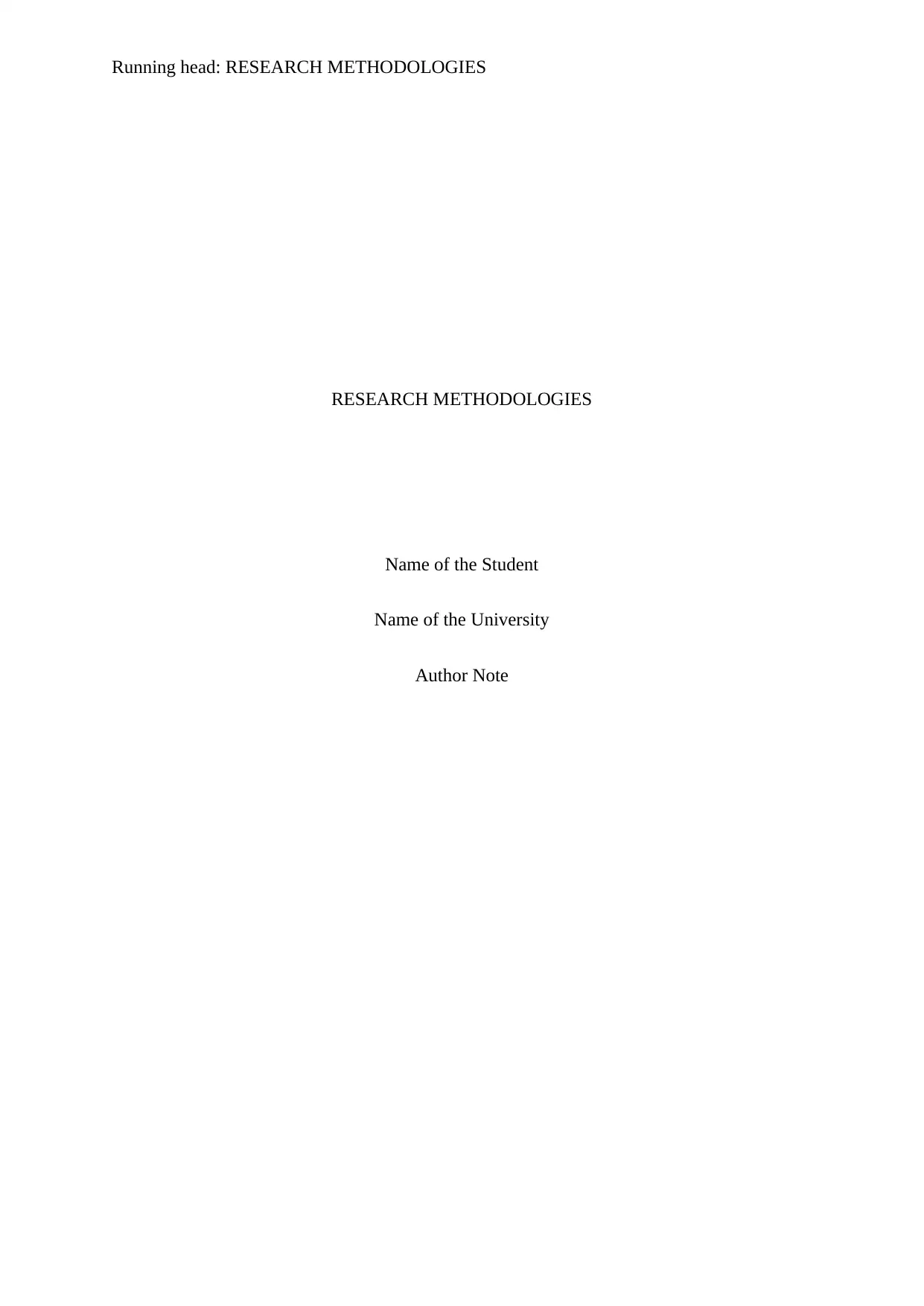
Running head: RESEARCH METHODOLOGIES
RESEARCH METHODOLOGIES
Name of the Student
Name of the University
Author Note
RESEARCH METHODOLOGIES
Name of the Student
Name of the University
Author Note
Paraphrase This Document
Need a fresh take? Get an instant paraphrase of this document with our AI Paraphraser
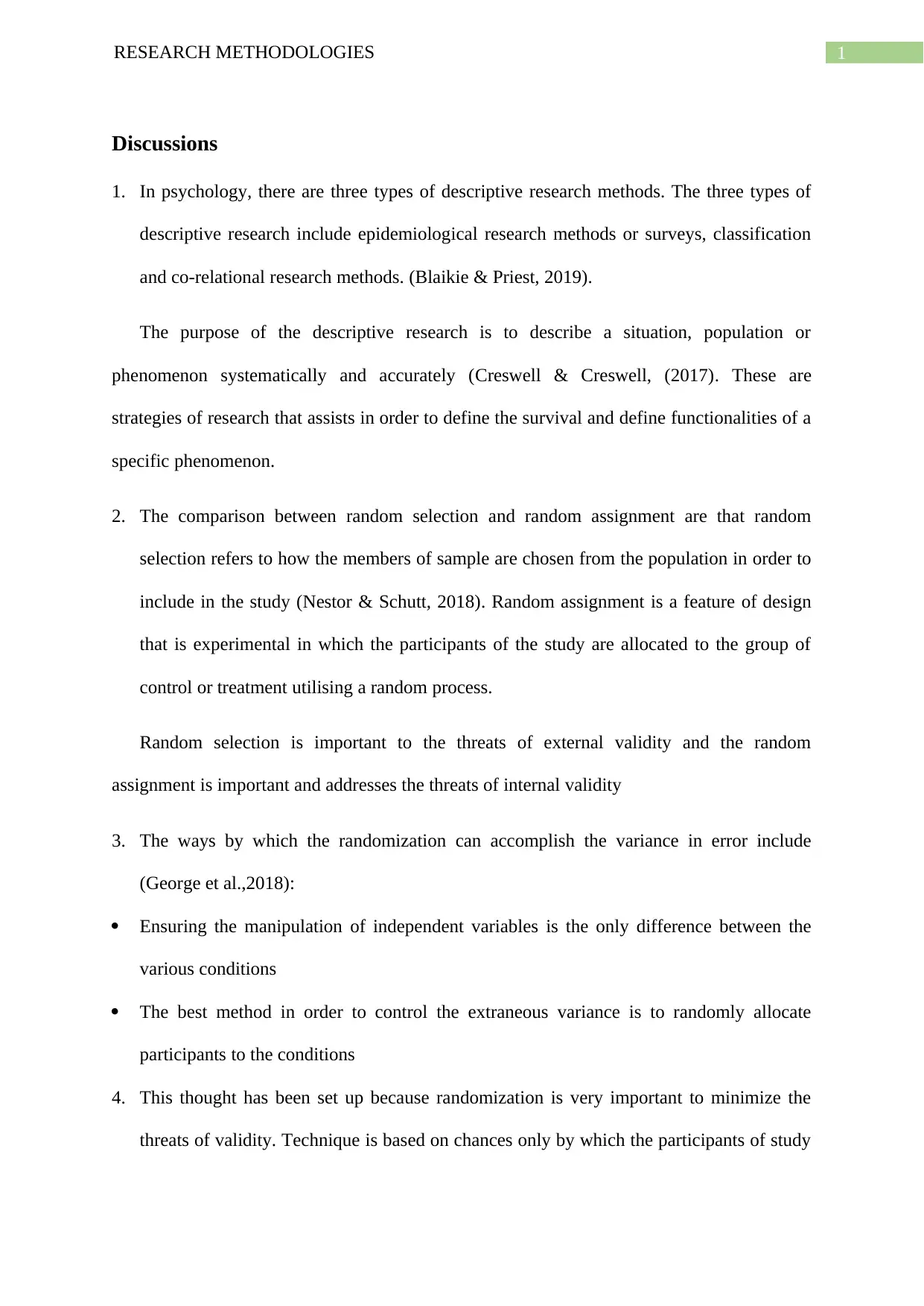
1RESEARCH METHODOLOGIES
Discussions
1. In psychology, there are three types of descriptive research methods. The three types of
descriptive research include epidemiological research methods or surveys, classification
and co-relational research methods. (Blaikie & Priest, 2019).
The purpose of the descriptive research is to describe a situation, population or
phenomenon systematically and accurately (Creswell & Creswell, (2017). These are
strategies of research that assists in order to define the survival and define functionalities of a
specific phenomenon.
2. The comparison between random selection and random assignment are that random
selection refers to how the members of sample are chosen from the population in order to
include in the study (Nestor & Schutt, 2018). Random assignment is a feature of design
that is experimental in which the participants of the study are allocated to the group of
control or treatment utilising a random process.
Random selection is important to the threats of external validity and the random
assignment is important and addresses the threats of internal validity
3. The ways by which the randomization can accomplish the variance in error include
(George et al.,2018):
Ensuring the manipulation of independent variables is the only difference between the
various conditions
The best method in order to control the extraneous variance is to randomly allocate
participants to the conditions
4. This thought has been set up because randomization is very important to minimize the
threats of validity. Technique is based on chances only by which the participants of study
Discussions
1. In psychology, there are three types of descriptive research methods. The three types of
descriptive research include epidemiological research methods or surveys, classification
and co-relational research methods. (Blaikie & Priest, 2019).
The purpose of the descriptive research is to describe a situation, population or
phenomenon systematically and accurately (Creswell & Creswell, (2017). These are
strategies of research that assists in order to define the survival and define functionalities of a
specific phenomenon.
2. The comparison between random selection and random assignment are that random
selection refers to how the members of sample are chosen from the population in order to
include in the study (Nestor & Schutt, 2018). Random assignment is a feature of design
that is experimental in which the participants of the study are allocated to the group of
control or treatment utilising a random process.
Random selection is important to the threats of external validity and the random
assignment is important and addresses the threats of internal validity
3. The ways by which the randomization can accomplish the variance in error include
(George et al.,2018):
Ensuring the manipulation of independent variables is the only difference between the
various conditions
The best method in order to control the extraneous variance is to randomly allocate
participants to the conditions
4. This thought has been set up because randomization is very important to minimize the
threats of validity. Technique is based on chances only by which the participants of study
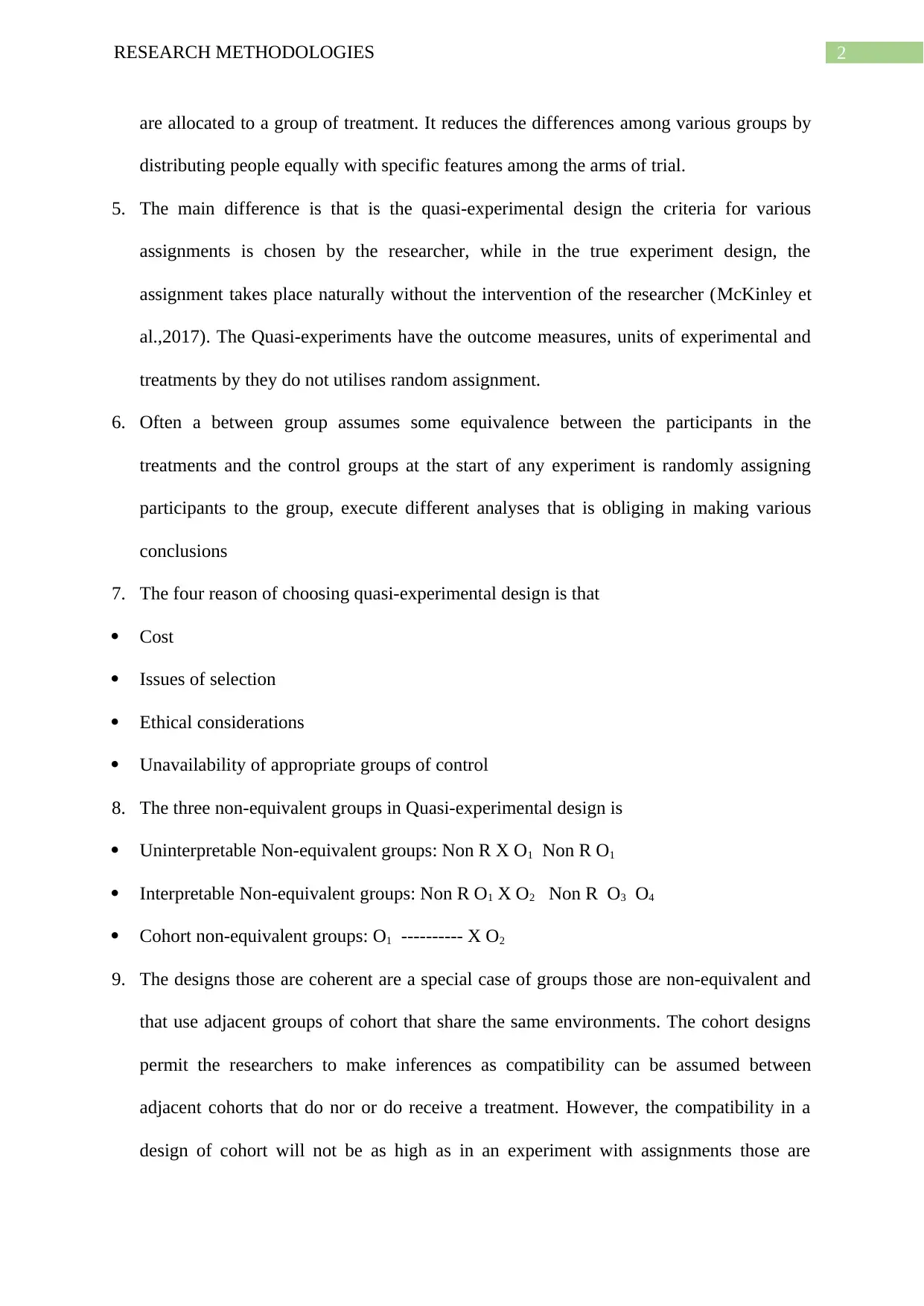
2RESEARCH METHODOLOGIES
are allocated to a group of treatment. It reduces the differences among various groups by
distributing people equally with specific features among the arms of trial.
5. The main difference is that is the quasi-experimental design the criteria for various
assignments is chosen by the researcher, while in the true experiment design, the
assignment takes place naturally without the intervention of the researcher (McKinley et
al.,2017). The Quasi-experiments have the outcome measures, units of experimental and
treatments by they do not utilises random assignment.
6. Often a between group assumes some equivalence between the participants in the
treatments and the control groups at the start of any experiment is randomly assigning
participants to the group, execute different analyses that is obliging in making various
conclusions
7. The four reason of choosing quasi-experimental design is that
Cost
Issues of selection
Ethical considerations
Unavailability of appropriate groups of control
8. The three non-equivalent groups in Quasi-experimental design is
Uninterpretable Non-equivalent groups: Non R X O1 Non R O1
Interpretable Non-equivalent groups: Non R O1 X O2 Non R O3 O4
Cohort non-equivalent groups: O1 ---------- X O2
9. The designs those are coherent are a special case of groups those are non-equivalent and
that use adjacent groups of cohort that share the same environments. The cohort designs
permit the researchers to make inferences as compatibility can be assumed between
adjacent cohorts that do nor or do receive a treatment. However, the compatibility in a
design of cohort will not be as high as in an experiment with assignments those are
are allocated to a group of treatment. It reduces the differences among various groups by
distributing people equally with specific features among the arms of trial.
5. The main difference is that is the quasi-experimental design the criteria for various
assignments is chosen by the researcher, while in the true experiment design, the
assignment takes place naturally without the intervention of the researcher (McKinley et
al.,2017). The Quasi-experiments have the outcome measures, units of experimental and
treatments by they do not utilises random assignment.
6. Often a between group assumes some equivalence between the participants in the
treatments and the control groups at the start of any experiment is randomly assigning
participants to the group, execute different analyses that is obliging in making various
conclusions
7. The four reason of choosing quasi-experimental design is that
Cost
Issues of selection
Ethical considerations
Unavailability of appropriate groups of control
8. The three non-equivalent groups in Quasi-experimental design is
Uninterpretable Non-equivalent groups: Non R X O1 Non R O1
Interpretable Non-equivalent groups: Non R O1 X O2 Non R O3 O4
Cohort non-equivalent groups: O1 ---------- X O2
9. The designs those are coherent are a special case of groups those are non-equivalent and
that use adjacent groups of cohort that share the same environments. The cohort designs
permit the researchers to make inferences as compatibility can be assumed between
adjacent cohorts that do nor or do receive a treatment. However, the compatibility in a
design of cohort will not be as high as in an experiment with assignments those are
⊘ This is a preview!⊘
Do you want full access?
Subscribe today to unlock all pages.

Trusted by 1+ million students worldwide
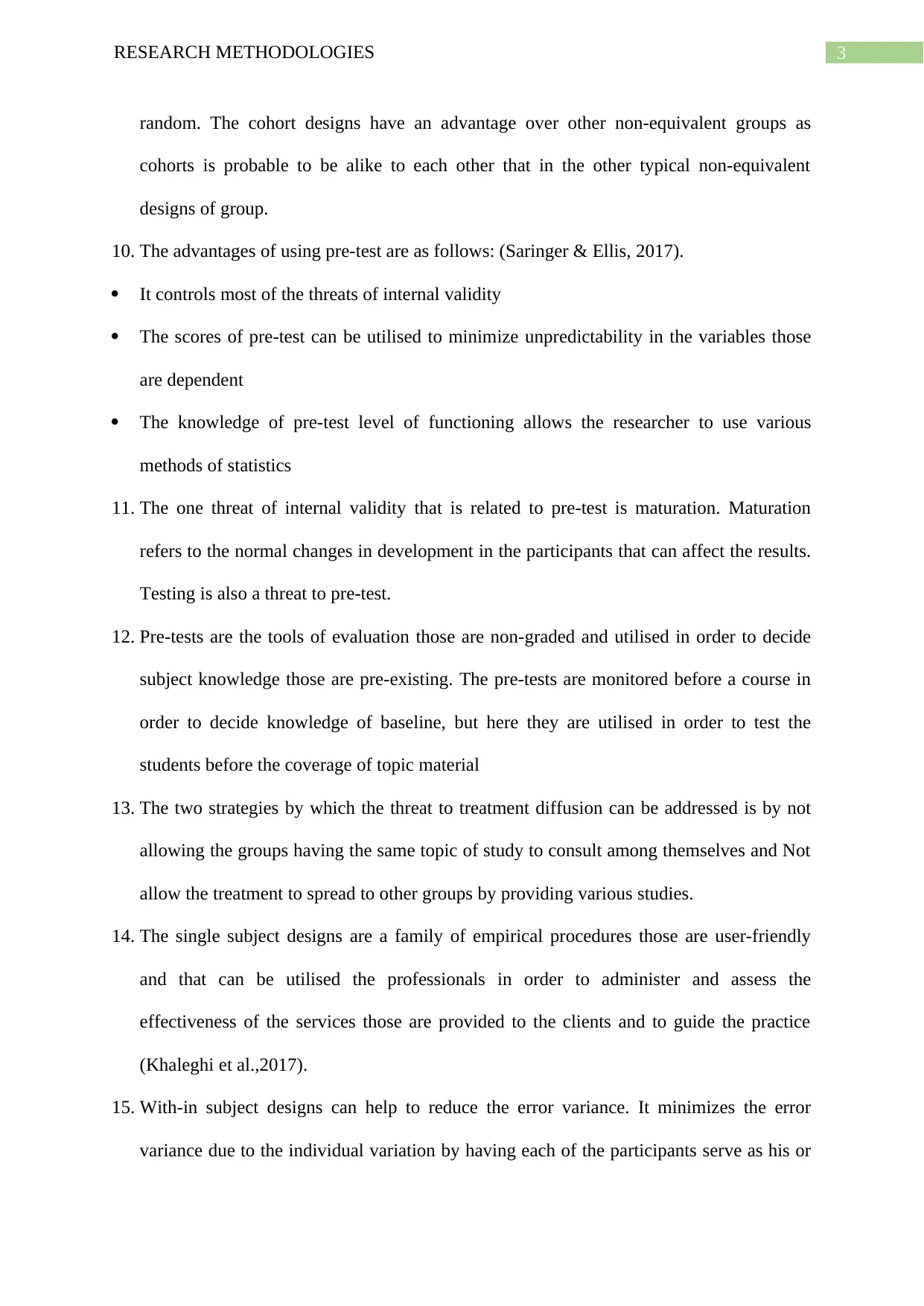
3RESEARCH METHODOLOGIES
random. The cohort designs have an advantage over other non-equivalent groups as
cohorts is probable to be alike to each other that in the other typical non-equivalent
designs of group.
10. The advantages of using pre-test are as follows: (Saringer & Ellis, 2017).
It controls most of the threats of internal validity
The scores of pre-test can be utilised to minimize unpredictability in the variables those
are dependent
The knowledge of pre-test level of functioning allows the researcher to use various
methods of statistics
11. The one threat of internal validity that is related to pre-test is maturation. Maturation
refers to the normal changes in development in the participants that can affect the results.
Testing is also a threat to pre-test.
12. Pre-tests are the tools of evaluation those are non-graded and utilised in order to decide
subject knowledge those are pre-existing. The pre-tests are monitored before a course in
order to decide knowledge of baseline, but here they are utilised in order to test the
students before the coverage of topic material
13. The two strategies by which the threat to treatment diffusion can be addressed is by not
allowing the groups having the same topic of study to consult among themselves and Not
allow the treatment to spread to other groups by providing various studies.
14. The single subject designs are a family of empirical procedures those are user-friendly
and that can be utilised the professionals in order to administer and assess the
effectiveness of the services those are provided to the clients and to guide the practice
(Khaleghi et al.,2017).
15. With-in subject designs can help to reduce the error variance. It minimizes the error
variance due to the individual variation by having each of the participants serve as his or
random. The cohort designs have an advantage over other non-equivalent groups as
cohorts is probable to be alike to each other that in the other typical non-equivalent
designs of group.
10. The advantages of using pre-test are as follows: (Saringer & Ellis, 2017).
It controls most of the threats of internal validity
The scores of pre-test can be utilised to minimize unpredictability in the variables those
are dependent
The knowledge of pre-test level of functioning allows the researcher to use various
methods of statistics
11. The one threat of internal validity that is related to pre-test is maturation. Maturation
refers to the normal changes in development in the participants that can affect the results.
Testing is also a threat to pre-test.
12. Pre-tests are the tools of evaluation those are non-graded and utilised in order to decide
subject knowledge those are pre-existing. The pre-tests are monitored before a course in
order to decide knowledge of baseline, but here they are utilised in order to test the
students before the coverage of topic material
13. The two strategies by which the threat to treatment diffusion can be addressed is by not
allowing the groups having the same topic of study to consult among themselves and Not
allow the treatment to spread to other groups by providing various studies.
14. The single subject designs are a family of empirical procedures those are user-friendly
and that can be utilised the professionals in order to administer and assess the
effectiveness of the services those are provided to the clients and to guide the practice
(Khaleghi et al.,2017).
15. With-in subject designs can help to reduce the error variance. It minimizes the error
variance due to the individual variation by having each of the participants serve as his or
Paraphrase This Document
Need a fresh take? Get an instant paraphrase of this document with our AI Paraphraser
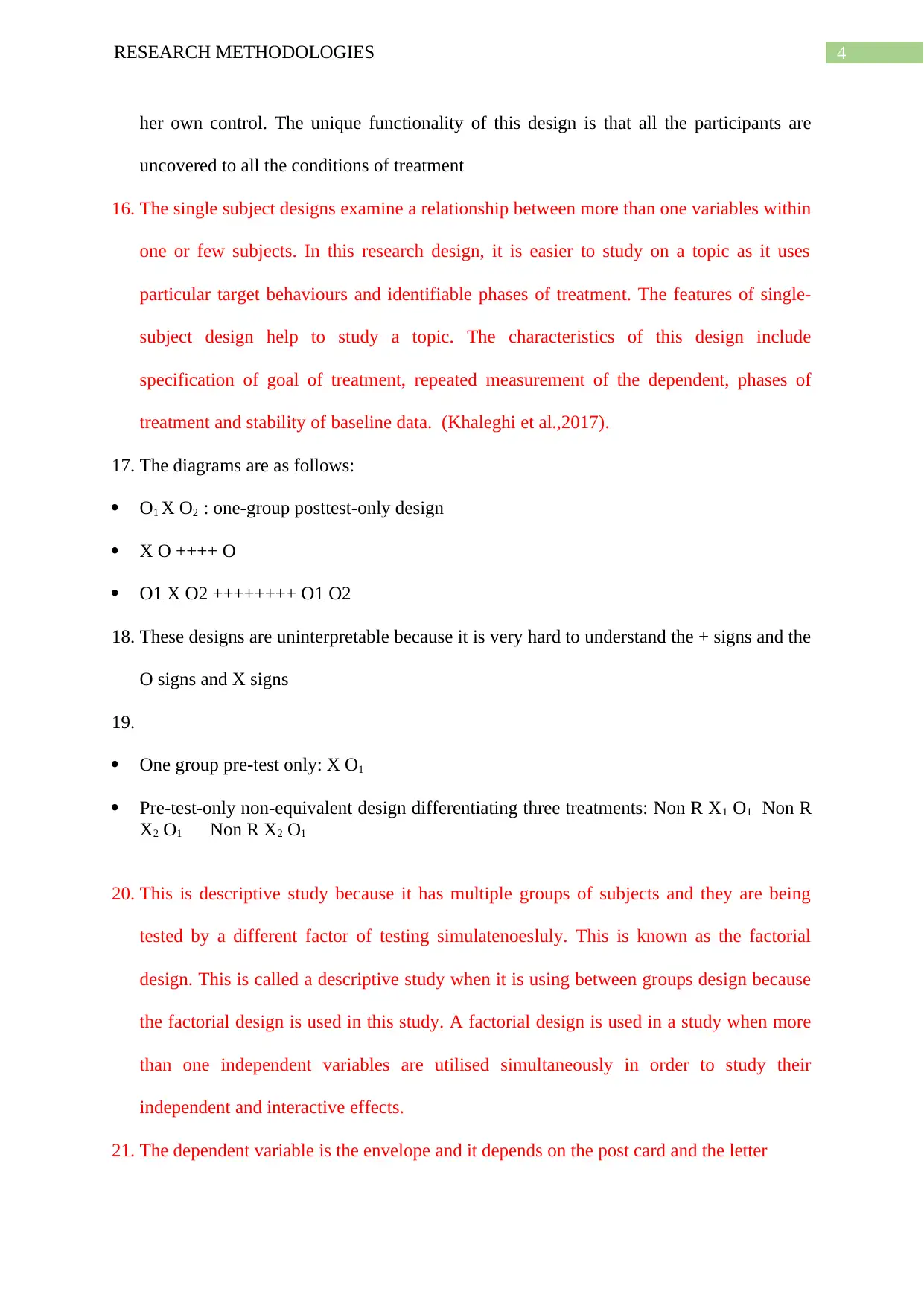
4RESEARCH METHODOLOGIES
her own control. The unique functionality of this design is that all the participants are
uncovered to all the conditions of treatment
16. The single subject designs examine a relationship between more than one variables within
one or few subjects. In this research design, it is easier to study on a topic as it uses
particular target behaviours and identifiable phases of treatment. The features of single-
subject design help to study a topic. The characteristics of this design include
specification of goal of treatment, repeated measurement of the dependent, phases of
treatment and stability of baseline data. (Khaleghi et al.,2017).
17. The diagrams are as follows:
O1 X O2 : one-group posttest-only design
X O ++++ O
O1 X O2 ++++++++ O1 O2
18. These designs are uninterpretable because it is very hard to understand the + signs and the
O signs and X signs
19.
One group pre-test only: X O1
Pre-test-only non-equivalent design differentiating three treatments: Non R X1 O1 Non R
X2 O1 Non R X2 O1
20. This is descriptive study because it has multiple groups of subjects and they are being
tested by a different factor of testing simulatenoesluly. This is known as the factorial
design. This is called a descriptive study when it is using between groups design because
the factorial design is used in this study. A factorial design is used in a study when more
than one independent variables are utilised simultaneously in order to study their
independent and interactive effects.
21. The dependent variable is the envelope and it depends on the post card and the letter
her own control. The unique functionality of this design is that all the participants are
uncovered to all the conditions of treatment
16. The single subject designs examine a relationship between more than one variables within
one or few subjects. In this research design, it is easier to study on a topic as it uses
particular target behaviours and identifiable phases of treatment. The features of single-
subject design help to study a topic. The characteristics of this design include
specification of goal of treatment, repeated measurement of the dependent, phases of
treatment and stability of baseline data. (Khaleghi et al.,2017).
17. The diagrams are as follows:
O1 X O2 : one-group posttest-only design
X O ++++ O
O1 X O2 ++++++++ O1 O2
18. These designs are uninterpretable because it is very hard to understand the + signs and the
O signs and X signs
19.
One group pre-test only: X O1
Pre-test-only non-equivalent design differentiating three treatments: Non R X1 O1 Non R
X2 O1 Non R X2 O1
20. This is descriptive study because it has multiple groups of subjects and they are being
tested by a different factor of testing simulatenoesluly. This is known as the factorial
design. This is called a descriptive study when it is using between groups design because
the factorial design is used in this study. A factorial design is used in a study when more
than one independent variables are utilised simultaneously in order to study their
independent and interactive effects.
21. The dependent variable is the envelope and it depends on the post card and the letter
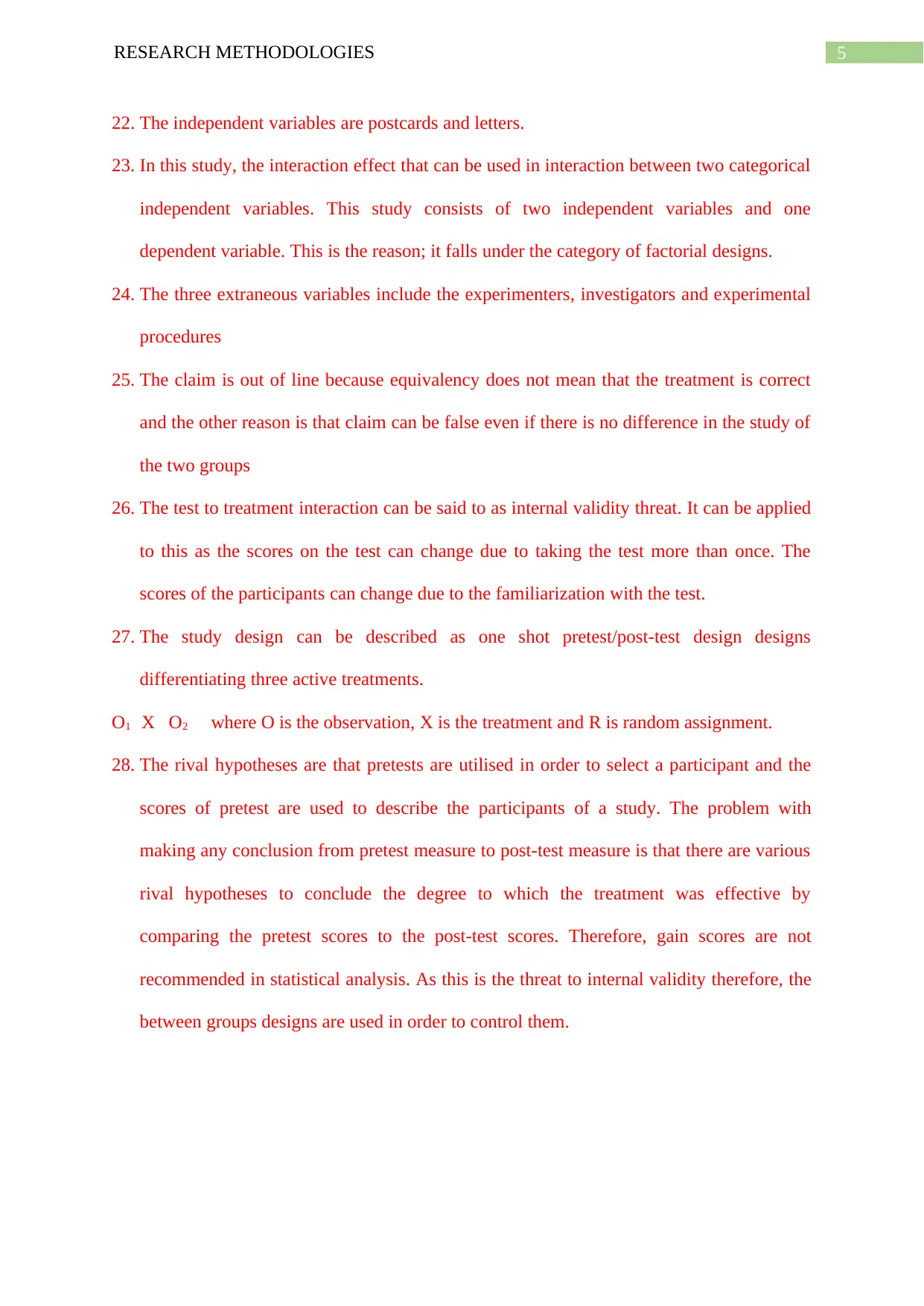
5RESEARCH METHODOLOGIES
22. The independent variables are postcards and letters.
23. In this study, the interaction effect that can be used in interaction between two categorical
independent variables. This study consists of two independent variables and one
dependent variable. This is the reason; it falls under the category of factorial designs.
24. The three extraneous variables include the experimenters, investigators and experimental
procedures
25. The claim is out of line because equivalency does not mean that the treatment is correct
and the other reason is that claim can be false even if there is no difference in the study of
the two groups
26. The test to treatment interaction can be said to as internal validity threat. It can be applied
to this as the scores on the test can change due to taking the test more than once. The
scores of the participants can change due to the familiarization with the test.
27. The study design can be described as one shot pretest/post-test design designs
differentiating three active treatments.
O1 X O2 where O is the observation, X is the treatment and R is random assignment.
28. The rival hypotheses are that pretests are utilised in order to select a participant and the
scores of pretest are used to describe the participants of a study. The problem with
making any conclusion from pretest measure to post-test measure is that there are various
rival hypotheses to conclude the degree to which the treatment was effective by
comparing the pretest scores to the post-test scores. Therefore, gain scores are not
recommended in statistical analysis. As this is the threat to internal validity therefore, the
between groups designs are used in order to control them.
22. The independent variables are postcards and letters.
23. In this study, the interaction effect that can be used in interaction between two categorical
independent variables. This study consists of two independent variables and one
dependent variable. This is the reason; it falls under the category of factorial designs.
24. The three extraneous variables include the experimenters, investigators and experimental
procedures
25. The claim is out of line because equivalency does not mean that the treatment is correct
and the other reason is that claim can be false even if there is no difference in the study of
the two groups
26. The test to treatment interaction can be said to as internal validity threat. It can be applied
to this as the scores on the test can change due to taking the test more than once. The
scores of the participants can change due to the familiarization with the test.
27. The study design can be described as one shot pretest/post-test design designs
differentiating three active treatments.
O1 X O2 where O is the observation, X is the treatment and R is random assignment.
28. The rival hypotheses are that pretests are utilised in order to select a participant and the
scores of pretest are used to describe the participants of a study. The problem with
making any conclusion from pretest measure to post-test measure is that there are various
rival hypotheses to conclude the degree to which the treatment was effective by
comparing the pretest scores to the post-test scores. Therefore, gain scores are not
recommended in statistical analysis. As this is the threat to internal validity therefore, the
between groups designs are used in order to control them.
⊘ This is a preview!⊘
Do you want full access?
Subscribe today to unlock all pages.

Trusted by 1+ million students worldwide
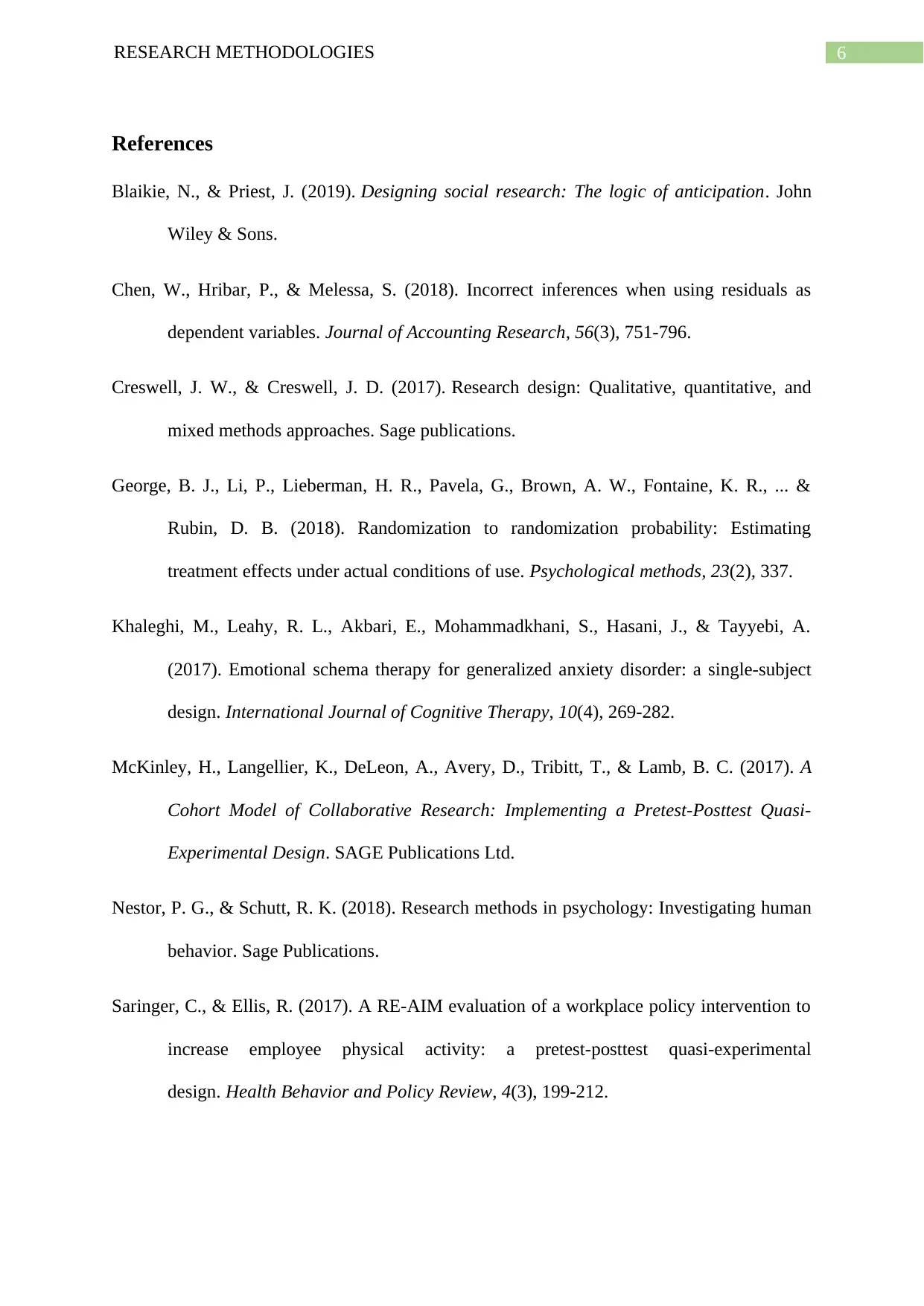
6RESEARCH METHODOLOGIES
References
Blaikie, N., & Priest, J. (2019). Designing social research: The logic of anticipation. John
Wiley & Sons.
Chen, W., Hribar, P., & Melessa, S. (2018). Incorrect inferences when using residuals as
dependent variables. Journal of Accounting Research, 56(3), 751-796.
Creswell, J. W., & Creswell, J. D. (2017). Research design: Qualitative, quantitative, and
mixed methods approaches. Sage publications.
George, B. J., Li, P., Lieberman, H. R., Pavela, G., Brown, A. W., Fontaine, K. R., ... &
Rubin, D. B. (2018). Randomization to randomization probability: Estimating
treatment effects under actual conditions of use. Psychological methods, 23(2), 337.
Khaleghi, M., Leahy, R. L., Akbari, E., Mohammadkhani, S., Hasani, J., & Tayyebi, A.
(2017). Emotional schema therapy for generalized anxiety disorder: a single-subject
design. International Journal of Cognitive Therapy, 10(4), 269-282.
McKinley, H., Langellier, K., DeLeon, A., Avery, D., Tribitt, T., & Lamb, B. C. (2017). A
Cohort Model of Collaborative Research: Implementing a Pretest-Posttest Quasi-
Experimental Design. SAGE Publications Ltd.
Nestor, P. G., & Schutt, R. K. (2018). Research methods in psychology: Investigating human
behavior. Sage Publications.
Saringer, C., & Ellis, R. (2017). A RE-AIM evaluation of a workplace policy intervention to
increase employee physical activity: a pretest-posttest quasi-experimental
design. Health Behavior and Policy Review, 4(3), 199-212.
References
Blaikie, N., & Priest, J. (2019). Designing social research: The logic of anticipation. John
Wiley & Sons.
Chen, W., Hribar, P., & Melessa, S. (2018). Incorrect inferences when using residuals as
dependent variables. Journal of Accounting Research, 56(3), 751-796.
Creswell, J. W., & Creswell, J. D. (2017). Research design: Qualitative, quantitative, and
mixed methods approaches. Sage publications.
George, B. J., Li, P., Lieberman, H. R., Pavela, G., Brown, A. W., Fontaine, K. R., ... &
Rubin, D. B. (2018). Randomization to randomization probability: Estimating
treatment effects under actual conditions of use. Psychological methods, 23(2), 337.
Khaleghi, M., Leahy, R. L., Akbari, E., Mohammadkhani, S., Hasani, J., & Tayyebi, A.
(2017). Emotional schema therapy for generalized anxiety disorder: a single-subject
design. International Journal of Cognitive Therapy, 10(4), 269-282.
McKinley, H., Langellier, K., DeLeon, A., Avery, D., Tribitt, T., & Lamb, B. C. (2017). A
Cohort Model of Collaborative Research: Implementing a Pretest-Posttest Quasi-
Experimental Design. SAGE Publications Ltd.
Nestor, P. G., & Schutt, R. K. (2018). Research methods in psychology: Investigating human
behavior. Sage Publications.
Saringer, C., & Ellis, R. (2017). A RE-AIM evaluation of a workplace policy intervention to
increase employee physical activity: a pretest-posttest quasi-experimental
design. Health Behavior and Policy Review, 4(3), 199-212.
1 out of 7
Related Documents
Your All-in-One AI-Powered Toolkit for Academic Success.
+13062052269
info@desklib.com
Available 24*7 on WhatsApp / Email
![[object Object]](/_next/static/media/star-bottom.7253800d.svg)
Unlock your academic potential
Copyright © 2020–2026 A2Z Services. All Rights Reserved. Developed and managed by ZUCOL.





